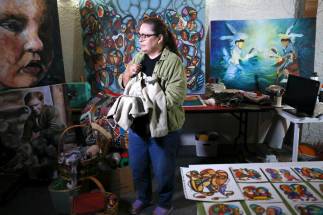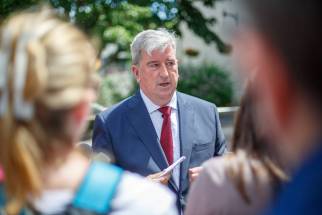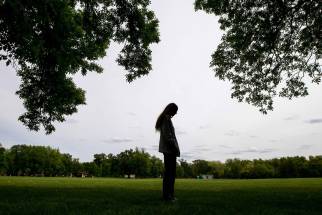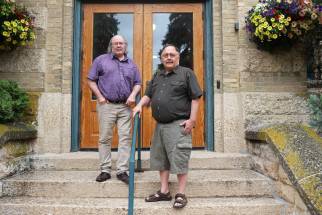Winning assessment Manitoba playwrights earn national award for play based on process of compensating residential school survivors
Read this article for free:
or
Already have an account? Log in here »
To continue reading, please subscribe:
Monthly Digital Subscription
$0 for the first 4 weeks*
- Enjoy unlimited reading on winnipegfreepress.com
- Read the E-Edition, our digital replica newspaper
- Access News Break, our award-winning app
- Play interactive puzzles
*No charge for 4 weeks then price increases to the regular rate of $19.00 plus GST every four weeks. Offer available to new and qualified returning subscribers only. Cancel any time.
Monthly Digital Subscription
$4.75/week*
- Enjoy unlimited reading on winnipegfreepress.com
- Read the E-Edition, our digital replica newspaper
- Access News Break, our award-winning app
- Play interactive puzzles
*Billed as $19 plus GST every four weeks. Cancel any time.
To continue reading, please subscribe:
Add Free Press access to your Brandon Sun subscription for only an additional
$1 for the first 4 weeks*
*Your next subscription payment will increase by $1.00 and you will be charged $16.99 plus GST for four weeks. After four weeks, your payment will increase to $23.99 plus GST every four weeks.
Read unlimited articles for free today:
or
Already have an account? Log in here »
Hey there, time traveller!
This article was published 22/06/2022 (1264 days ago), so information in it may no longer be current.
Does justice have a price tag?
Can you put a fee on trauma?
Can money erase memories of a harrowing experience?
Thorny questions no doubt but ones that playwrights Darrell Racine and Dale Lakevold don’t shy away from.
The Brandon University professors have won a national award for their play IAP, which tells the story of two Winnipeg men who go through the government’s Independent Assessment Process for former residential school students.
The play received the Best Full-Length Play award in the Theatre BC Canadian National Playwriting Competition 2021.
Racine, an assistant professor of Native Studies, and Lakevold, an associate professor in English, Drama and Creative Writing, say Indigenous culture and reconciliation are recurring themes in their work.
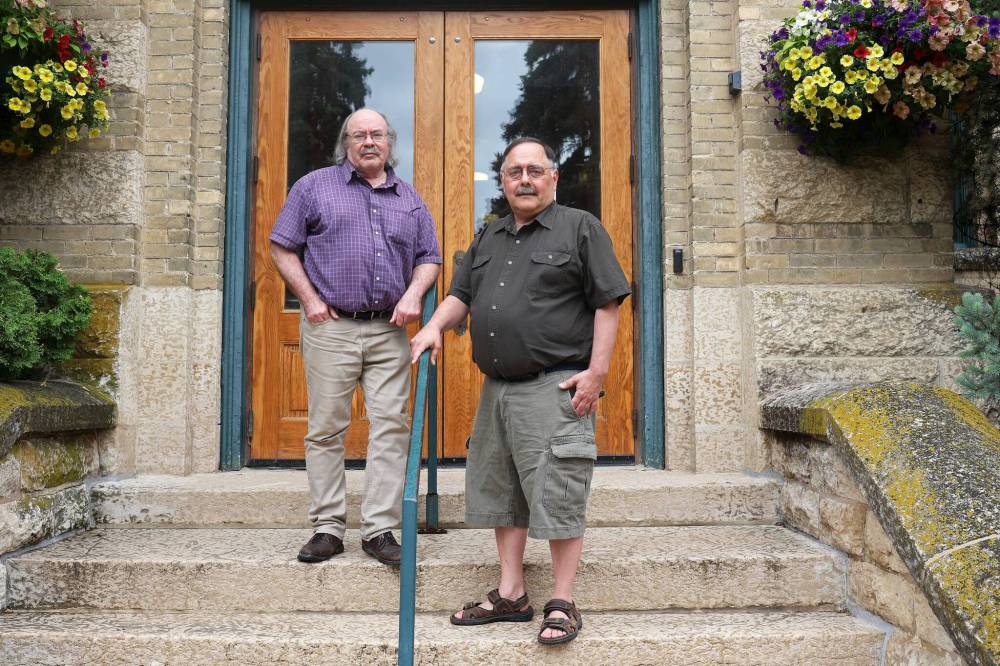
“We are really focused on this idea of reconciliation. Our plays are about reconciliation at different levels. IAP is about contemporary reconciliation; the residential school experience is still something that is very much in the forefront of Indigenous and non-Indigenous minds,” Racine says.
“The story involves two men who go through the process,” Lakevold says. “Even though the subject matter is heavy, and the process is quite disturbing, we try to show how affirming their experience is, how they are supported by their family, by their culture.”
Around 38,000 people re-lived their traumatic experience for the IAP, culminating in the largest class-action settlement suit in Canadian history. While it is now complete, with 100 per cent of the claims received being resolved, the method of assessing the claims is being called into question.
“We have an obligation to show the Canadian public about how First Nations people are being compensated for what they have been through,” Racine explains.
“It could have been done in a more sensitive manner. Insert a lot more compassion to that process, provide a lot more care afterwards; there was some but not enough. Often people are retraumatized because they are having to go through this and tell their story in order to be compensated.”
“We have an obligation to show the Canadian public about how First Nations people are being compensated for what they have been through.” – Darrell Racine
The process was based on a medical model, Racine elaborates. There was thought in Indigenous communities that it was going to be healing. It turned out to be otherwise, with aspects of it remaining colonial.
“They have that ring of colonial process to them. It’s not healing; it’s financial compensation. If you broke your finger at your residential school, then you get this amount of money. If it involved sexual abuse, then how grave was the sexual abuse and then we will settle a particular amount of money for that,” he explains.
The duo has been friends and collaborators for 25 years and plans to write more plays which explore the history of Indigenous culture in Canada. IAP is their fourth play and the second to have won this award.
The other, Stretching Hide, won in 2005 and was produced by Theatre Projects Manitoba in Winnipeg and published by Scirocco Drama in 2007.
“We hope that our series of plays will help non-Indigenous Canadians to better understand Canada’s history of colonialism and more recent historical events that have affected Indigenous people adversely,” Lakevold says.
“Our plan is to write a total of seven plays that explore Indigenous culture and history in Canada, although there are many more that could possibly be written. We’re on our fifth play– Sixties Scoop — right now.” – Dale Lakevold
“Our plan is to write a total of seven plays that explore Indigenous culture and history in Canada, although there are many more that could possibly be written. We’re on our fifth play — Sixties Scoop — right now.”
The pair have honed their writing process; they talk about certain themes over the course of a year and decide together which ideas need to be put on stage.
Once that’s been decided writing starts daily from 1 p.m. to 5 p.m at Racine’s home in Brandon. They work on it line by line, Lakevold handwriting everything down before going home to type it up. The following day they read and adjust the script.
“Darrell can be a little impatient with me because I am more of a detailed person as far as the writing goes,” Lakevold says. “He really likes to tell stories; he comes from the Metis community where oral culture is integral. It’s a fantastic experience working with him.”
According to Racine, Lakevold is the more technical writer
“Dale guides the structure, and the mechanics of getting it correct,” Racine says. “He is technically sound in regards to creative writing and play writing.”
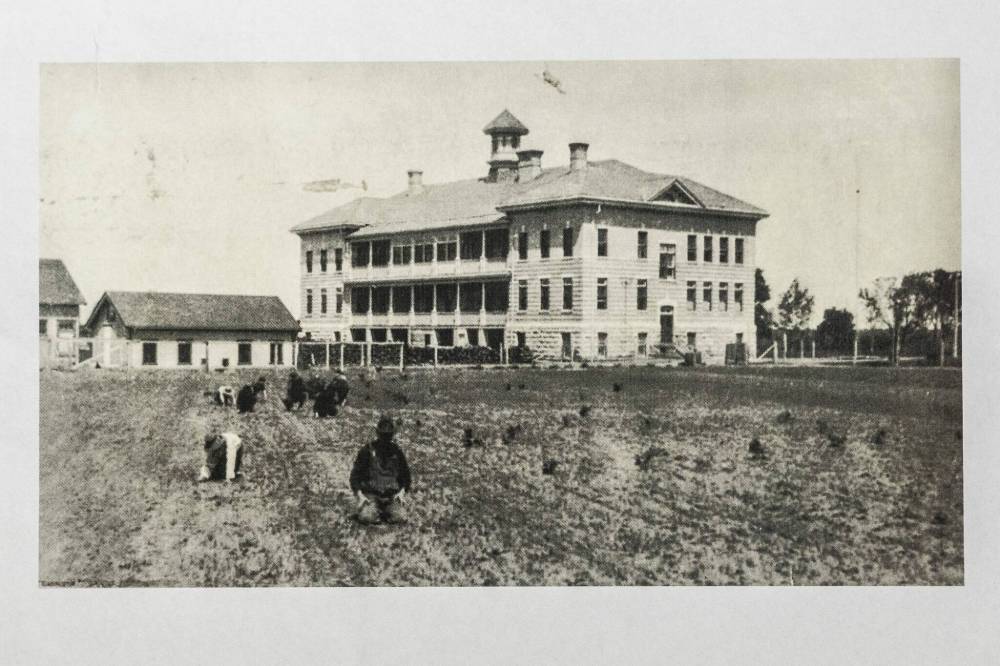
Researching and developing IAP was done meticulously and carefully. The pair wanted to make sure they got things right as they developed and wrote the script, consulting with a lawyer who had represented more than 2,000 former residential school students in the IAP process.
The play has not yet been produced but a script reading directed by Tracey Nepinak had excellent response from the invited audience of former residential school survivors, mental health workers, elders, and IAP adjudicators and researchers.
“We had to know that we got it correct. It is a very sensitive issue and we had to make sure it was done properly,” Racine says. “And the response from the survivors was beyond anything we could have hoped for. Overall, it was a very positive experience for everyone.”
The pair has been trying to interest production companies and theatres to put on the play and they say winning the prize will give them a leg up.
“We were very gratified to receive the award, mainly because we hope that it might draw more attention to Indigenous people’s struggle to obtain justice,” Lakevold says.
The play will also contribute to important research. IAP is part of a research study entitled Reconciling Perspectives and Building Public Memory: Learning from the Independent Assessment Process, which is supported by the Social Sciences and Humanities Research Council of Canada (SSHRCC) and led by Dr. Cindy Hanson of the University of Regina.
av.kitching@freepress.mb.ca

Our newsroom depends on a growing audience of readers to power our journalism. If you are not a paid reader, please consider becoming a subscriber.
Our newsroom depends on its audience of readers to power our journalism. Thank you for your support.

